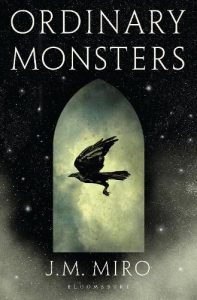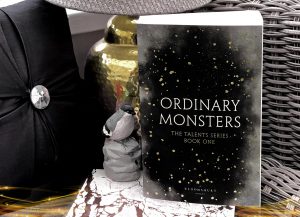ORDINARY MONSTERS by J. M. Miro (BOOK REVIEW)
“What else is loss? What is death? Who doesn’t believe in things they can’t explain? God and the angels, gravity and electricity, death and the mystery of life. There are forces we understand, and forces we still do not.”
Ordinary Monsters by J.M. Miro is a richly layered historical fantasy set in 1882. The story spans from the streets of the southern United States, to Victorian England, to Tokyo, Vienna and to Edinburgh. In the midst of poverty and prejudice exist orphaned children who have extraordinary abilities called Talents. These are children who live solitary, lonely lives on the streets, struggling to hide their gifts from the unforgiving world. Abused, starving, forgotten or persecuted for being different. Yet there are those few who seek to bring the children to safety, to a place they can call home, where their talents can be studied and honed.

In a remote estate just on the outskirts of Edinburgh resides Cairndale Institution, the one place to offer sanctuary to these broken children. Yet there is also one who hunts them, a figure with a face of smoke. There are forces at work who seek the world of the living and the world of the dead to collide, with catastrophic consequences. But when secrets begin to unravel Miro will force us to consider who are the real monsters in this tale?
Throughout the novel Miro takes us on a journey following the lives of Charlie Ovid, a sixteen year old bi-racial boy accused of killing a white man in Mississippi. When the authorities attempt to execute Charlie, they discover something strange, terrifying—he cannot die, his body heals with not a scratch left on him. Then there’s Marlowe, a baby found in a freight car, his skin glowing with a bluish light, a woman lying dead next to him. Marlowe can either burn flesh or heal it, and as he grows, so does his power. We then travel to a theatre in Tokyo, where within a flashback scene, we discover a young girl and her sister hiding in the attic. Komako, a young girl who can manipulate and animate dust. It falls upon detective Alice Quicke and her partner Frank Coulton to gather these children and bring them to Cairndale. Though this task is not easy when being stalked by deadly figures, or when who you actually work for and their true intentions are concealed.
Miro writes superb characterisation, he demands that we fully understand each of their backgrounds, their suffering and pain. And we do. That is the sheer beauty of this book, I felt deeply for almost every character. Charlie and Marlowe develop a genuine brotherly bond, both orphaned, both lonely and both lost in a world they don’t quite belong in. Although we do not meet Komako, Ribs and Oskar until later on, we see these children eager to accept others into their band, to empathise and build connections with others like them. In essence they become the strongest of found families because they choose each other. In a world where secrets and lies reign, where anyone who is different is shunned and demonised, Miro reflects a poignant tale of accepting who you are, of celebrating your differences, of finding a place to belong.
“…you waste all this time dreaming of where you came from, cause you know no one comes from nothing. And you tell yourself, if you only knew, then maybe you could see a reason for how you got to be the way you are. Why your life looks like
it does. But there isn’t any reason, not really.”
These well crafted characters also extend to the ‘villains’ too. Miro did a spectacular job with making me feel for the morally grey, more sinister characters, to the point where I asked myself, ’can good be found in a villain?’ ‘Can a hero also be evil?’ One such character is Jacob Marber, a young boy starving on the streets of Vienna, a gentle boy who had to be cared for and protected by his younger brother, until tragedy befell them. Although for a spell Jacob’s life improved as he became older, beneath the surface, simmering away, the loss of his brother consumed him. In his vulnerable state it is easy to understand why his character was manipulated by dark forces, to a degree we understand his actions, and if you’re anything like me, his story will make you cry.
Much of this novel may be set in Victorian England, but I thoroughly loved how Miro subverted from the traditional Victorian roles which women are often portrayed in through literature. The women in this novel are far from weak, subservient housewives, or noble ladies of leisure. Alice Quicke, Brynt, Miss Davenshaw and Mrs Harrowgate are women with sheer willpower, playing powerful roles, whether the world appreciates it or not. However Miro does also illustrate the hardships of Victorian life too as the era was never kind to the poor, the young, the elderly, and the outcasts. We see children living lives as street urchins, sweeping chimneys, cleaning machinery in factories, losing fingers, losing hands, losing their lives on a daily basis.
I just love Miro’s darkly atmospheric prose, his gothic setting, and the melancholy which runs through many chapters. We explore bleak themes such as extreme poverty, prejudice, grief and the veil between life and death. In fact Ordinary Monsters is rather dark with fantastical inventions too, with concepts such as the orsine—the barrier between our world and the land of the dead—and the glyphic which keeps the barrier closed. There’s also the keywrasse which I won’t say any more on as it’s a rather significant mystery within the book. Together all these elements immersed me into a bizarre world, a fascinating one where I never knew quite what to expect next.
I would say this book holds resemblances to other works such as X-Men, Miss Peregrine’s Home for Peculiar Children and Umbrella Academy, whilst still being entirely its own story. Whereas personally I found Miss Peregrine and Umbrella Academy lacking in depth as to explaining the children’s powers, Miro includes a wealth of depth. Each child’s abilities are described in detail, and as the narrative shifts to Cairndale Institution we learn a great deal more about their limitations, weaknesses and the five kinds of Talents which exist. I also felt echoes of Lord of the Rings though this book is nothing like it. However, with characters such as Walter the litch, who fascinated me from his very first chapter, I saw traits of Gollum; from the conflicting voices inside his mind, to the way we pity such a feral creature, and even in the way he refers to himself in the third person—Walter, Walter. I also noticed one of the magical artefacts that two of our main protagonists are sent to find reminded me of the One Ring. If in close proximity the artefact made those who touched it never want to let it go, to keep it safe, to understand how precious it was.
In almost seven hundred pages Ordinary Monsters sweeps its readers through gaslit streets, remote estates, through depravity and peril, and leaves you aching for every character. Miro weaves an exquisite historical fiction, captivating and bursting with heart.
“Goodness wasn’t a matter of
perspective and he’d seen too much suffering to want to see more of it in
the world. But the wrong kind of hoping led to bitterness, and bitterness led only to the gutter.”
ARC provided by Philippa at Bloomsbury Publishing UK. Thank you for the copy! All quotes used are taken from an ARC and are subject to change.
Ordinary Monsters is out today!


Brilliant review, Nils. I’m reading this now and loving it. Miro’s writing is so atmospheric and hypnotizing, I barely know I’m reading a 700 page book😁
Thanks Tammy! I’m so glad you’re enjoying it too! I loved so many characters in this one, they really touch your heart by the end. And yes, those 700 pages fly by!